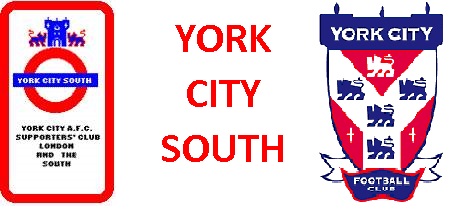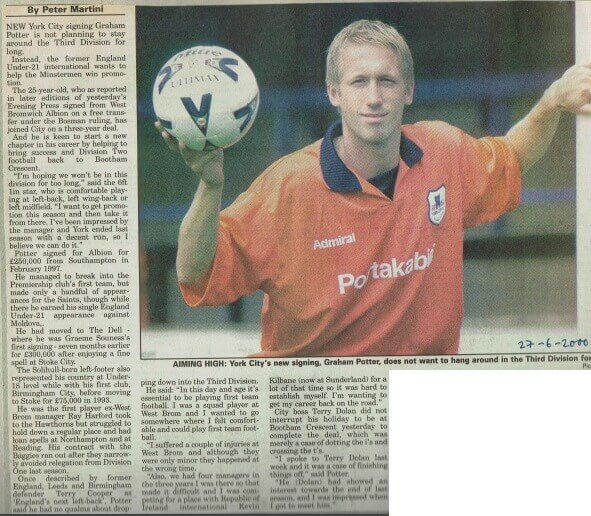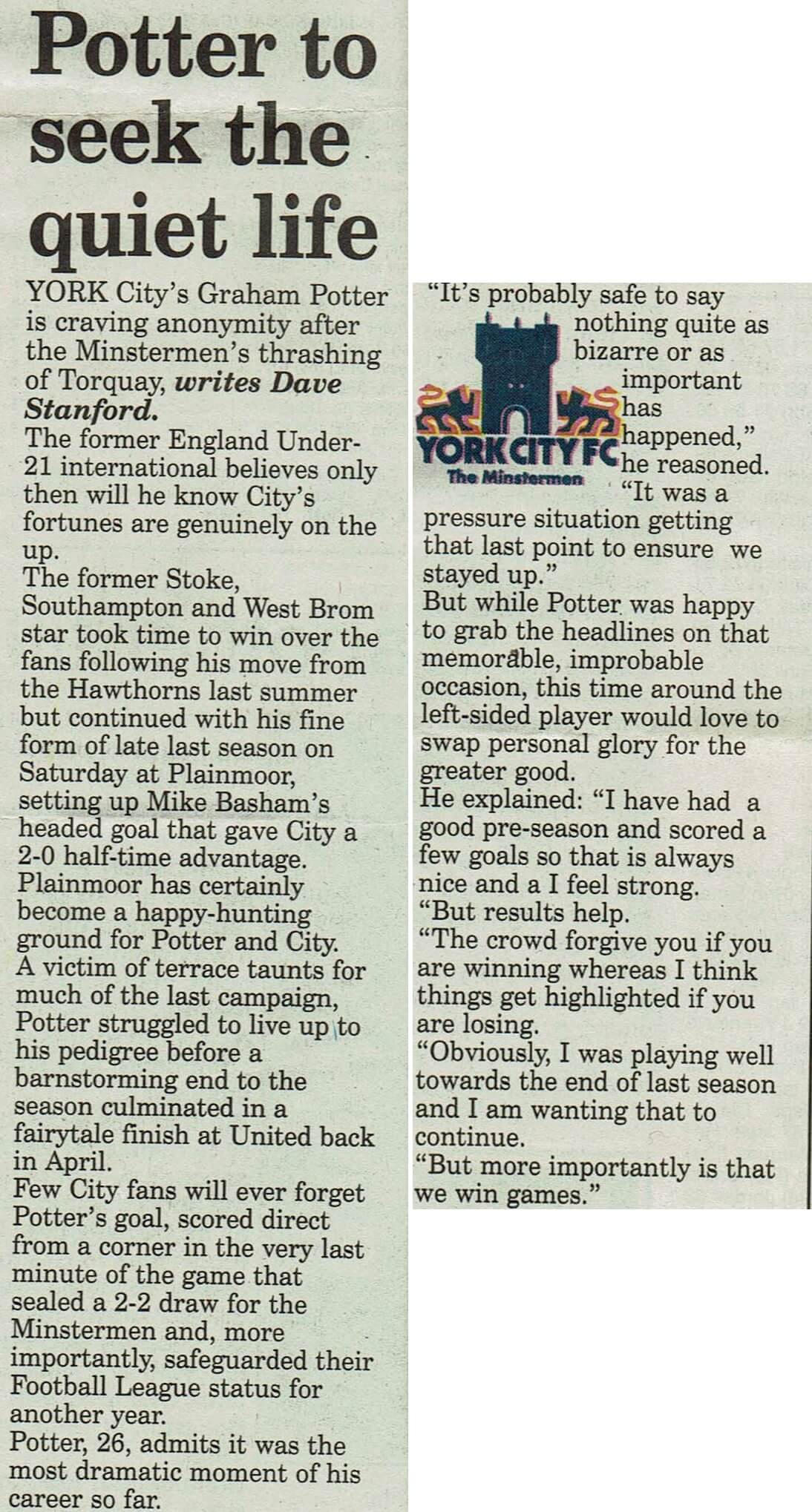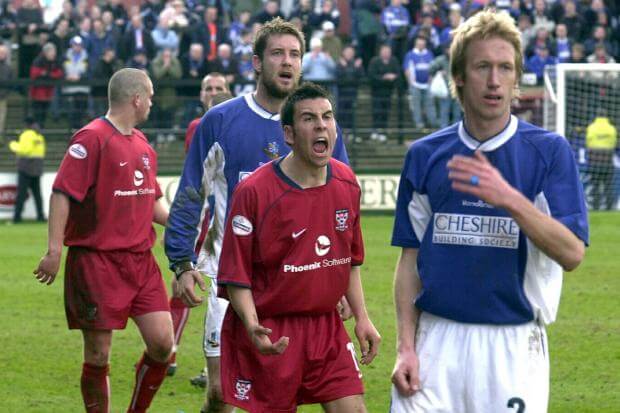

Graham Potter
Dropping down 2 divisions it was something of a coup for City to sign Graham Potter
Starting his career with Birmingham City, Graham Potter spent his first 8 years as a pro playing largely in Division 1 (now The Championship) with Birmingham, Stoke, Southampton and WBA as his parent clubs.

At Southampton he made 8 Premier League appearances including the infamous 6-3 win over the grey shirts of Manchester United. It was while he was there he gained his one and only England Under 21 cap.
It is probably fair to say, that apart from the 1995/6 season, he was never a regular, but that season's form earned him a £250,000 move to Southampton.
In June 2000, aged 25, he left WBA and joined York City on a Bosman free transfer on a 3 year contract. Later he said, "I sort of replaced Wayne Hall who was a bit of a legend at the club and, if I'm being honest, I wasn't very good as I was adapting to League Two football and the supporters made it known that they felt that was the case too. I had to win them over and I think I did to a certain extent over time, but it was all great experience for me at a great club and I loved York as a city, because it's a fantastic place".
He spent 3 seasons with City and was our regular left back under Terry Dolan as City struggled in the basement division. He made 131 appearances, scoring 8 goals for City.
Dolan, speaking on
York Hospital Ball, recalled Potter as being studious and quick to take on information and to spot when tactical changes needed to be made, but didn't see the management potential in him.
In 2003, at the end of his City contract, he moved onto Boston and later played for Shrewsbury and Macclesfield before retiring from playing in 2005.
A career in coaching at a low level followed with several teams, mainly around Yorkshire, including a spell as City’s Under 13 coach that would go on to become the club's best youth team during recent times, finishing runners up to Hull City in the 2009/10 Football League Youth Alliance north-east table.
In December 2010, Potter was appointed as head coach of Östersund, a fourth tier club in Sweden. He overhauled the club, effectively a village team when he arrived, with his innovative coaching methods, which included getting his players to put on shows for the local population, ideas aimed at getting the players out of their comfort zone and making them better able to adapt to on pitch situations.
It was those coaching methods, coupled with Östersund’s rise to the Sweden’s top tier that brought Potter to wider attention.
One of the players who flourished under Potter at Östersund was Jamie Hopcutt, who he knew from his City days. Potter praised Hopcutt after the Arsenal game, "Jamie has been brilliant and has done as much on the pitch at Ostersunds as anybody else to get us where we are and that's credit to him after moving over from Tadcaster Albion. I've known him since he was 13 and, sometimes, I think we've still got that same relationship. He's a talented player who did well in York's youth team but, maybe, he wasn't quite ready for first-team football and, then, there's nowhere for players like him to go, which is a big problem and challenge for English football. The under-13s I had at York were a really good group but, whilst our programmes up to 18 are some of the best in the world as a country, that pathway to the first team isn't always there. That's different in Sweden. Younger players can play adult football in lower leagues and there aren't so many people watching, but the English game is very competitive. York are playing in the sixth tier and can get crowds between 3,000 and 4,000, which puts incredible pressure on the first team and results. Most managers' timespan in a job isn't very long and, to a certain extent, you can understand why they wouldn't take a chance on an unproven youth player when they could be out of work in a few months if they're not winning matches. Thankfully, with Jamie, we offered him something and he’s had a lot of first-team football now. He contributed enormously to the game at Arsenal and had a really good understanding of what we wanted to do, so I'm really pleased for him".
By winning the Swedish FA Cup in 2017, Östersund gained entry into the UEFA Cup. Finishing second in the group stage, Östersund progressed through the round of 32 with a 2-1 win at The Emirates Stadium to knock out Arsenal. After the win over Arsenal, he noted, "... potential as a coach was never going to be recognised by any chairman at a professional club in his birth country, whilst he was working at such a young age group and in universities, as he did at Hull and Leeds Met. There are talented people everywhere, but it's not so easy to get the opportunities. That's the reality of football, I suppose. I started off at York City coaching the under-13s and really enjoyed it. It was great. Then, I just tried to think about how I could improve as a coach and what I needed to do to get better and took the opportunity that came my way to do that. I couldn’t really rely on what I’d done as a player, because I wasn’t very good and the truth is, when I stopped playing at 30 and went into coaching at youth and university level, I was never going to get the York City job because people want somebody with experience. I had to go a different pathway and, thankfully, it's worked out well". Östersund were eliminated by Athletic Bilbao in the next round.
That was enough for Swansea who appointed Potter as head coach in the summer of 2018 as they sought a quick return to The Premier League. It wasn’t to be, but Potter enhanced his reputation as Swansea played a passing style of football that was easy on the eye and came close to upsetting Manchester City in the FA Cup. 2 players who came of age under Potter were Daniel James and Ollie McBurnie who earned summer 2019 moves to Manchester United and Sheffield United respectively.
At the same time, Potter was appointed head coach of Premier League side Brighton, by December 2019 he had signed a new 6 year contract as he made an impact at Brighton. At the time, Potter was saddened by City's National League North status but still harboured fond memories of the club, despite initially being a target for the Bootham Crescent boo boys.
"It's been a shame watching from a distance what's happened over the years and I wish the club well. It's close to my heart, because I spent three happy years in York. It was quite a turbulent period and we were fighting to stay up at first, but we turned it around a bit and just missed out on the play-offs. Personally, I remember struggling for the first six months". Having played with Jon Parkin at Bootham Crescent, as well as Macclesfield, Potter went on to stress that he isn't shocked to see the veteran's goalscoring exploits on his return to City, "We've stayed in touch with text messages over the years and I'm not surprised at all to see Jon still doing what he is. He always had ability and quality and was a great lad to have in the dressing room, with a personality everybody likes. I obviously knew him when he was younger and always said, if he'd had a better attitude, he would have been a top, top player, but he's still had a fantastic career. When he came to York, he'd been released by Barnsley and had hit the bottom a bit, but he went to Macclesfield with me and was amazing there and has been brilliant ever since. The next challenge for him, having gone from a player to an experienced player, is whether he can take that responsibility of becoming a young coach and pass on all the knowledge and experience he’s had during a long career. He's had ups and downs and probably has a lot to offer, because he’s an intelligent lad as well and I'll be interested to see how his career develops. I'm sure he can instil some good habits into a club that has been struggling a little bit".
2022 ...the future is unwritten.
Previous attempts to get Potter as a guest speaker at a YCS meeting failed due to logistics (cost from Sweden, Östersund’s UEFA game clash at Arsenal and covid).



